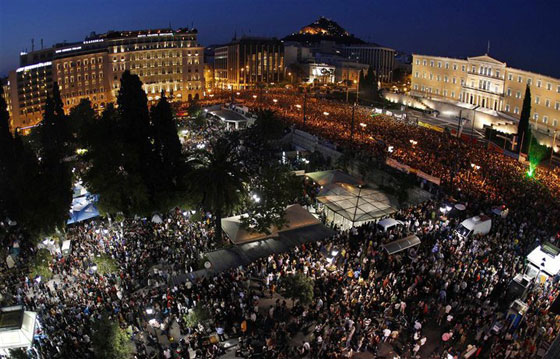These are quotes from Aggelos Varvarousis' Phd thesis, written in light of the unprecedented expansion of commoning projects in Greece in the wake of the 2011 movement.
Varvarousis studied not only so called "self-sufficient" commons, but also many new - sometimes ephemeral - commoning processes, especially in urban contexts. Together with collegues a data basism an index of Commons/commoning projects in Greece was pulled together. "In its final draft, the index included approximately 500 formal and informal organizations that could be characterized as commoning projects." (p.44/45)

Greek uprising, Athens, 29 May 2011. Photo: Kotsolis.
source ![]()
# Features
"the introduction of the term ―commoningby historian Peter Linebaugh as recently as 2008, as the term marked the different content that the commons would acquire in contexts of crisis. The commons were no anymore treated as things, but as processes that are made and remade according to needs and to the social, economic and spatial relations that commoners invent and try out. (p.10)
"instances of commoning" = when "people pool resources and labor in order to create common goods or to jointly manage their shared space, infrastructure and waste; what is more, they do so without any recognizable leadership or top-down hierarchy." (p.36)
Commons happen." (p.10)
This shift from the commons as resources to commoning, which prioritizes sociospatial relations that are always in flux, offered us the opportunity to use the language of the commons to talk about a series of phenomena we either could not theorize before or had been theorizing in different terms. This shift revealed that commons, or rather, practices of commoning, can be encountered almost everywhere; in the public space, in schools, in slums, within families, in factories, in streets and in many other places. Similarly, the commons can be found in social movements and in political struggles, in periods of emergency or even in contexts of remote island vacations; the (re)production of the commons has become a synonym for the collective (re)production of life itself. (p.11)
Commoning is a learning process, so there can be no single theory to capture and foresee its future. On the other hand, theorization and reflection are necessary as there is no transcendental necessity in human history. (p.15)
Within crisis,commoners are transitional subjects who, in the process of commoning, bring along all their doubts and ambiguities. The commons become transitional social systems too; rather than being the product of rational calculations of isolated individuals, they become laboratories for the production of new forms of subjectivity, sociality and spatiality and are invested with fears and hopes for the transition to a post-crisis condition and the establishment of a new, more just normality. Hence, any theory aiming to make sense of the new commons that emerge in contexts of crisis cannot but challenge and expand Ostrom‘s original theoretical framework. (p.21)
This new conception of the commons as the main vehicle for societal transformation beyond and against capitalism has led several thinkers of this current to adopt some highly polarized and therefore controversial terms to describe different aspects of commoning. Caffentzis and Federici~ 24 ~ (2014) speak of anti-capitalist commons, to distinguish them from ―pro-capitalist‖ ones (Caffentzis 2010; Caffentzis & Federici 2011). Likewise, De Angelis uses the terms ―distorted commons‖ and ―commons fix‖ to describe those commons that do not conform to his idea of how commons should be (De Angelis 2013); Hardt and Negri (2009) speak of ―corrupted commons‖ to describe those processes, ventures and social relations that, despite having commoning at their heart, produce ―more of the same‖ and reaffirm capital and the domination of private property. Thus, it does not come as a surprise that some of the above scholars dismiss the work of Elinor Ostrom either as inadequate and irrelevant or as neoliberal and dangerous (e.g. Caffentzis 2004). (p23/24)
The main aim of this chapter is to explore the role of liminality in the formation of the subjects of commoning and of common space more generally. In the first stream of the literature on the commons, the one stemming from Ostrom‘s tradition, there is little attention to the commons as mechanisms of subjectification; the subjects of commoning are considered fixed and with given motives that are limited to economic reasoning. (p.50)
Notwithstanding the rich literature on the connections between the movement of the squares and the theory of the commons, in most of the aforementioned accounts the focal point is the link between the movements‘ commoning practices and the broader theory of counter-hegemonic politics; therefore, the exploration of the various elements of these commons hinges on their role in anti-capitalist struggle. Most of the above accounts constitute macro-observations and general theorizations and are rarely grounded in empirical work that can highlight the contradictions and the complexity of the field. As Paul Chatterton and Jenny Pickerill recently put it, ―still missing, are detailed empirical accounts of the messy, gritty and real everyday rhythms as activists envision, negotiate, build and enact life beyond the capitalist status quo in the everyday‖ 6 . If the encampments of indignant movements were instances of commoning, what can they tell us about the broader theory of commons? How do they challenge Ostrom‘s theoretical framework?
POST http://image-transporter.apps.allmende.io/image
# See also
Commoning, Commons Liminal Commons Definitions of Commoning Stavros Stavrides on Commons and Commoning
# Sources
Aggelos Varvarousis 2018: Crisis, Commons & Liminality, Modern rituals of transition in Greece PhD Thesis, ICTA, UAB Supervisors: Giorgos Kallis, Dina Vaiou, Christos Zografosyour